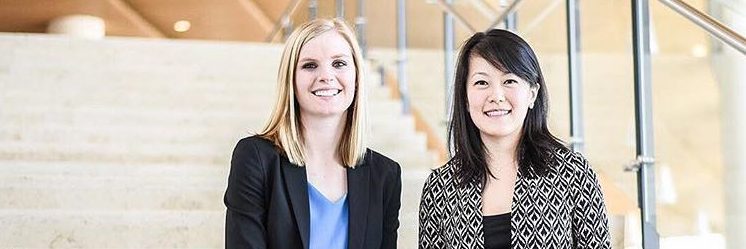News Roundup – Rutgers MBA Wins Big, HBS Professor Weighs in on EY’s Recent Press, and More

Let’s take a look at some of the biggest stories from this week, including a Rutgers award winner, and much more.
Student’s Excitement for Business Problem Helped Her Win Award – Rutgers Business School News
The National Black MBA Association recently honored Rutgers Business School MBA student Livonia Mitchell with the “Best Presenter” award in its annual case competition last month. It was Mitchell’s first time participating in such an event.
Fiat Chrysler Automobiles sponsored the competition, which includes students from 36 other schools. Students were required to present a case for how Fiat Chrysler could make a subscription car program profitable. They were required to present a marketing plan and a business model.
Mitchell, Director of Operations Excellence at Ports America, says of of her win, “The story really spoke to me … I connected with it. I think a lot of that came out.”
She is currently enrolled in RBS’ part-time MBA program, and plans to declare a concentration in Strategy and Leadership. For more on the competition at the Rutgers award winner, you can read here.
Enlightened Solutions: Modular Housing Developments for L.A.’s Homeless – UCLA Anderson School of Management News & Events
Two recent grads of the UCLA Anderson MBA program got some incredible news this month.
Their proposal to the LA City Council for housing for the homeless is to receive major funding to go forward. The nearly $24 million was granted to Greg Comanor (’19) and Aaron Sassounian (’19) to make their capstone project a reality.

The two created a project which combines affordable housing units, health care, and other services into one development using a for-profit model. Using Anderson’s Business Creation Option, the pair raised seed money with a friends-and-family campaign, and purchased a site in L.A.’s Watts neighborhood.
Comanor says of their concept, “Aaron and I were both real estate-focused students, coming from backgrounds in venture capital, investment banking, retail and multifamily development …We felt a nudge to do something socially conscious.”
In order to make the project truly come to fruition, they formed Daylight Community Development, which uses shipping containers to create modular units with the help of creative financing strategies.
Daylight’s Executive Director Tim Kawahara says of Daylight’s team, “They have identified a market niche where financial returns and social impact intersect. These are the types of solutions we need in order to build our way forward.”
You can read more on Daylight and their projects here.
Scholarship to Honor Professor John Dealy’s Commitment to Gender Equity in the Technology Industry – Georgetown McDonough School of Business
This month, Georgetown University’s McDonough School of Business established the Dealy Scholarship, a merit-based award for students who exemplify the values of gender equality in technology, finance, consulting, or other business fields.
Prashant Malaviya, Senior Associate Dean of MBA Programs at McDonough, says, “Gender equity is important to the future of business—whether in an MBA program or a corporate boardroom, there is tremendous value in diversity and inclusion … We are excited to begin awarding the Dealy scholarship to individuals who show [this] commitment.”
All applicants to the full-time MBA program will be eligible for the award, but they must show the qualities exemplified by Healy’s legacy. Joe Verbrugge (MBA ’97), says:
“John represented the reason you’d want to go to a school like Georgetown. [He] was the epitome of ‘we are all created equal’ here. He believed that whether you are a man or a woman, it’s about effort, diligence, and the creativity you bring to the work in front of you … He nurtured women leaders in a space where there aren’t a lot of women leaders; he gave amazing opportunities to anyone who put in the effort.”
Dealy passed away in 2017 after courageously fighting leukemia. His daughters, Anne and Marian, are both graduates of Georgetown. Anne, an attorney, and Marian, a microbiologist, were both present to comment on their father’s gift to the school and to his family.
“This scholarship is a very sweet recognition of my Dad,” Anne says. “He would very much appreciate [its] generosity and vision.”
You can read more on the Dealy family and the scholarship here.
NYU Stern Broadens Scope on Risk Assessment and Management with its Newly Expanded Volatility and Risk Institute – NYU Stern News & Events
NYU Stern recently announced the expansion and renaming of its Volatility and Risk Institute (VRI).
Since its creation a decade ago, the Institute and its associated V-Lab have provided measurement in real-time, along with forecasts of volatility for a vast array of financial assets.
The VRI will be directed by two NYU Stern faculty: Nobel Laureate Robert Engle, Professor of Management and Financial Services and creator of the V-lab; and Richard Berner, Professor of Management Practice and former Director of the Office of Financial Research
Raghu Sundaram, Dean of NYU Stern, says:
“I’m delighted to have Rob and Dick, two world-renowned experts on risk management, lead our newly expanded Volatility and Risk Institute … it will be a dynamic interdisciplinary hub [to] bridge the conversation between academia and industry, and to inspire novel research projects to address and manage the changing nature of risk facing today’s global firms.”
For more on the VRI, you can read here.
Women At Ernst & Young Instructed On How To Dress, Act Nicely Around Men – Huffington Post
Robin Ely, Professor of Business Administration at Harvard Business School, recently offered her perspective on some strange advice offered by Ernst & Young at a training forum, which was held in its new Hoboken office in the summer of 2018.
Among the bizarre pointers offered in the “Power-Presence-Purpose (PPP)” training program, geared toward women at EY, were “a good haircut, manicured nails, and well-cut attire that complements your body type… [But] don’t flaunt your body―sexuality scrambles the mind … Signal fitness and wellness.” Other sections of the program included highly questionable statements about the differences in brain size and differences in ability between genders.

Professor Ely, whose expertise lies in race and gender relations in various organizations, says, “There’s not a lot of empirical support [for these] trait differences between men and women … This curriculum is shot through with that assumption.”
Ely has conducted research on law firms that found predominant focus on outmoded stereotypes in companies that had a low percentage of women in the higher ranks. A former EY employee has spoken out about the training and the overall culture of the firm which focused largely on advancing men. Women make up only 12 percent of EY’s lead client service partners, she notes.
“The only way to succeed at EY is to work around the men. I heard that over and over,” she says. For the full Huffington Post article, read here.
News Roundup – Gies Online MBA Powers Illinois, Graziadio Professor on Women in the Age of AI, and More

Let’s take a look at some of the biggest stories from this week, including a Gies Online MBA helping power the state of Illinois.
Dr. Bernice Ledbetter Authors Opinion on Equipping Women with Opportunities to Thrive in Smart Machine Age – Pepperdine Graziadio Business School News
Dr. Bernice Ledbetter of the Pepperdine Graziadio Business School recently published her findings on the role of women in the age of AI.
A study by the McKinsey Global Institute found that smart machines will eventually perform the tasks performed by women in many business settings. Ledbetter’s research seeks to prompt lawmakers and policy makers to assist women in adapting their skill sets within this new landscape.
Dr. Ledbetter suggested three key guidelines to provide safeguards for women as work becomes automated—increase mentorship opportunities for women and outlets for women to hone leadership and utilize ‘soft skills;’ and to bolster investment in childcare and early childhood education. Women, according to research by the Institute for Women’s Policy Research, account for 58 percent of the workforce that will be affected by automation.
As the Dean of Students and Alumni Affairs at the Pepperdine Graziadio Business School and Director of the Pepperdine Center for Women in Leadership, Ledbetter works to inform and instruct on the issues faced by women in every sector of the economy. For more on her study and the future of AI in the workplace, read here.
Cardinal Health Partners with Vanderbilt Executive Education for Two Custom Leadership Programs – Vanderbilt Owen Graduate School of Business News
Vanderbilt University’s Owen Graduate School of Management has been leading a strategic partnership with Cardinal Health Partners to produce some of the best and brightest executives in the healthcare field.
The two programs, entitled INNOVATE and INSPIRE, are both nine months in duration. INNOVATE brings together thirty directors for assignments meant to help solve global healthcare issues. The directors, who reside at various international locations, meeting face-to-face six months into the program. At the end of the nine months, the team presents their projects to Cardinal executives who decide which ones they will implement.

Vanderbilt’s partnership with Cardinal Health Partners has brought two new healthcare executive programs to the Owen Graduate School of Management.
INSPIRE is comprised of fifteen Cardinal Health vice presidents whose goal it is to hone skills in entrepreneurial thinking, organizational management, and trend spotting. After deciding upon one ‘mega trend’, teams analyze how the trend is active within their organization and how it can be maximized for the best impact.
The intent of each program is to help executives and leaders to shift focus from operational concerns into more strategic and creative thinking. Jerome Revish is a Cardinal Health Vice President for Services and a participant in the INSPIRE program. He says:
“I’ve been at the VP level for a little over two years now. I would say as manager and director, you’re so focused on execution and driving results … It’s now, at this level and the next level, where more of your job is centered around framing the strategy of where we need to be going, versus ‘how do I execute what’s in front of me today.’”
For more on Owen’s executive education programs, read here.
iMBA Helps Power Windfree’s CEO to Power Illinois Homes and Businesses – Gies College of Business News
The University of Illinois Gies College of Business’ iMBA program has helped one entrepreneur to help bring solar power to the Midwest.
Eric Heineman is CEO of Windfree, Illinois’ TOP installer of solar panels for homes and businesses in the state. The iMBA, Gies’ 100 percent online degree, was a perfect choice for Heineman as he juggled the responsibility of raising children and pursuing his goal of creating a socially responsible business.
Crediting the “solar boom” in Illinois for part of his success, Heineman says, ““I don’t know how I would be able to stay in a master’s program if I didn’t have the flexibility of the iMBA. It’s something I’m very thankful for.” The iMBA has been a vital tool in Heineman’s advancement to CEO, as his business decisions are directly applicable to his online curriculum.
“It allows me to constructively second-guess everything I’m doing, and I have a great sounding board for my ideas,” he continues. Windfree was founded in 2009, and it has become a leader in providing solar energy to schools and other non-profit organizations. Windfree is responsible for the installation of numerous solar power devices in the state, including the Illinois Governor’s Mansion.
Heineman will complete his MBA in 2020. You can read here for more on Heineman, Windfree, and the iMBA.
2019 Massachusetts Family Business of the Year Award Winners – Northeastern D’Amore McKim School of Business News
Northeastern University’s D’Amore-McKim School of Business honored some of the state’s leading family businesses during an awards program last month. For over a decade, a panel of judges has chosen businesses that exemplify success, specifically through multi-generational legacies of their organizations. Community involvement and innovation are two other criteria upon which the winners are chosen.
The Clark School received an award for medium sized businesses. Provo Wealth Management Group won the Marshall Paisner Award for Small Firms. The Hub Folding Box Company took home the large business award, and the Award for Community Involvement was presented to J. Calnan & Associates.
For the last thirteen years, recipients of the Massachusetts Family Business of the Year Awards have been selected by a panel of independent judges based on the following criteria: business success; positive business and family linkages; multi-generational family involvement; contributions to the community and industry; and innovative business practices or strategies.
You can read here for more on the Family Business of the Year awards.
Learning from MIT Sloan’s First All-Female Senate Leadership Team

Women in leadership positions are still relatively rare. According to the latest report from MSCI, a research and analytics firm that helps leading investors build and manage portfolios, it could likely be 2027 before women fill just 30 percent of directorships in publicly held companies. Currently, they only hold 18.1 percent of such posts. But despite these discouragingly low numbers, significant progress is being made in other arenas. Recognizing and encouraging progress toward greater gender equity in business and in business school is extremely important if we want to help foster even more.
Fortunately, we need look no further than MIT Sloan School of Management to find clear signs of progress. During its most recent Senate election, two women were named co-presidents, marking the first time in the school’s history that its student government can claim an all-female top leadership team.
Avery Beach and Jennifer Zheng ran for co-presidents as a way to give back to MIT Sloan, a program that they said “has changed our lives.” They went on to explain, “Each of us felt strongly about the school’s potential and thought we could contribute to making it even better. We also believe that representation is extremely important. By running for co-president, we hope that we’ve inspired others, including underrepresented voices, to take on future leadership roles and continue Sloan’s mission to improve the world.”
Both women feel that it has been an extremely valuable opportunity to serve as the school’s first all-female Senate leadership team. In these roles, they have had a chance not only to develop their leadership skill set, but also to expand their network and impact their community.
“Our role as student leaders involves understanding how to influence key stakeholders, managing an organization of 60 students, and making frequent public speaking appearances,” explained Beach and Zheng. “We have learned and grown through this experience in an environment where it is okay to make mistakes. These failures and successes have made us better leaders, and this experience will translate into our work after school.”

Avery Beach and Jennifer Zheng
Serving as co-presidents of the Sloan Senate has been important to both women personally, but the experience has also convinced Beach and Zheng that it its important for other women, particularly female MBA students, to take on leadership roles within their programs and schools.
“Women are often underrepresented at the top of the career ladder,” they said. “By leading early and regularly, women can stand out in the current job market as well as in their future careers, such as during promotions. We hope that women continue to strive for these experiences.”
In the end, Beach and Zheng have felt empowered by their positions as Senate leaders and hope other women will feel the same. “As we look to the legacy we’ve left at the school, we hope to be remembered not only as effective female leaders, but as effective leaders—that is what will make a difference,” they said.
This article has been edited and republished with permissions from our sister site, Clear Admit.
Do Women Entrepreneurs Get Less VC Funding? Wharton and Columbia Researchers Find a Large Gender Gap

Over the last few years, there has been a lot of talk about more women in business. From the promotion of organizations like the Forté Foundation—which seeks to enhance women in business—to CNBC claiming “the Golden Age for women entrepreneurs has finally begun,” enterprising women seem to be everywhere. Unfortunately, this doesn’t mean that the deck is stacked in their favor. In fact, researchers from Columbia Business School and The Wharton School found the opposite was true.
The Gender Gap in Startup Funding
In a paper published in the Academy of Management Journal titled, “We Ask Men to Win & Women Not to Lose: Closing the Gender Gap in Startup Funding,” researchers looked at how women fared compared to men when they were trying to get funding for their startups.
After reviewing footage from the TechCrunch Disrupt startup competition, the researchers found that women were asked entirely different types of questions about their companies compared to their male counterparts. Men received more questions about their project’s potential for growth, while women received questions on the opposite end, about their potential risks and losses. This difference in questioning had a measurable impact on the funding each startup received.
The research paper, written by Dana Kanze (a Columbia Business School Ph.D. student), Laura Huang (a Wharton School Professor), Mark A. Conley (a Columbia Psychology Ph.D.), and E. Tory Higgins (a Columbia Psychology Professor), sought to delve into the enormous gender gap revealed in venture capital funding. According to the paper, only 2 percent of VC funding goes to women entrepreneurs in spite of the fact that women own 38 percent of U.S. businesses and represent 7 percent of venture capital firms.
One of the keys to this drastic difference in funding was how VCs—both male and female—framed funding questions for women-created businesses. Kanze explained the thought process in a Forbes article.
“According to the psychological theory of regulatory focus, investors adopted what’s called a promotion orientation when quizzing male entrepreneurs, which means they focused on hopes, achievements, advancement, and ideals,” Kanze said. “Conversely, when questioning female entrepreneurs, they embraced a prevention orientation, which is concerned with safety, responsibility, security, and vigilance.”
Inside the Research
To study how this difference in questioning impacted women and men entrepreneurs, the research team reviewed the Q&A sessions of 189 startup entrepreneurs—12 percent of whom were women—held by 140 prominent venture capitalists—40 percent of whom were women. Using software to analyze each session, researchers discovered that 67 percent of questions posted to men were promotion-oriented while 66 percent of questions posted to women were prevention-oriented.
In the end, the study found that this difference in questioning led to a huge difference in VC funding. Among comparable companies, the research team found that businesses that were asked prevention-oriented questions raised (on average) $2.3 million in funds in 2017, while their promotion-focused counterparts raised $16.8 million—nearly seven times more.
“In fact, for every additional prevention question asked of an entrepreneur, the startup raised a staggering $3.8 million less, on average,” Kanze told Forbes. She continued, saying, “Controlling for factors that may influence funding outcomes—like measures of startups’ capital needs, quality, and age, as well as entrepreneurs’ past experience—we discovered that the prevalence of prevention questions completely explained the relationship between entrepreneur gender and startup funding.”
However, there was some good news. For female entrepreneurs who received prevention-focused questions but responded with promotion-type answers, they were able to raise $7.9 million, versus $563,000. This suggests that regardless of how VCs phrase their questions, entrepreneurs can recover much of their funding potential if they answer in the positive.
To test their findings, the research team conducted an experiment that recreated the TechCrunch Disrupt conditions with 194 VCs—30 percent of whom were women—and 106 entrepreneurs—47 percent of whom were women. After removing startup specific details, the team asked the VCs to allocate $400,000 to their chosen entrepreneur.
According to the Kanze in a Harvard Business Review article, the team found that: “Angel investors allocated an average of $81,113 to startups in the prevention question, promotion answer condition—1.6 times larger than the $52,369 average allocated to those in the prevention question, prevention answer condition. Similarly, ordinary investors gave an average of $96,321 to the prevention question, promotion answer condition—1.7 times larger than the $55,377 average given to the prevention question, prevention answer condition.”
Speaking with Professor Laura Huang
To gain additional insight into the results of the research paper, we spoke with Professor Laura Huang at the Wharton School. Here’s what she has to say.
- What was the most surprising result that came out of your study?
“It was surprising that both men and women investors were equally as likely to ask prevention-focused questions to women, as opposed to promotion-focused. It wasn’t that men were the only ones biased, but that both genders were equally as likely to be biased.”
- Do you have any advice for female entrepreneurs looking to raise venture capital?
“Stop it in its tracks. When you see something like this happening, stop it immediately and redirect the response so that you’re making yourself on equal footing. Don’t allow that train of thought to go through where you’re getting asked prevention-focused questions and investors are focused on the risk. Answer the question that’s asked but redirect your response toward possibilities and success.”
- How do you think VC funding can change for the future to close the gender gap?
“Part of it is an awareness on the investors’ side. It’s also up to the entrepreneurs to redirect each question toward the right focus. A lot of this gap is implicit. Investors don’t realize they’re asking prevention-focused questions of women; they just automatically ask certain questions to each gender. Awareness around the tendency toward prevention-focused questions for women entrepreneurs and a focus on redirection toward promotion is key.”
Bauer Professor Honored as Houston Women in Business Champion of the Year

Saleha Khumawala, professor at the University of Houston – C.T. Bauer College of Business has been named the Houston Women in Business Champion of the Year by the U.S. Small Business Administration in Houston.
Rutgers Sets Up Mentoring Program in Vietnam

Rutgers Business School recently published an article by Susan Todd about Assistant Dean Sangeeta Rao’s June visit to the Ho Chi Minh National Academy in Hanoi, Vietnam, where she ran an intensive three-day training program on mentoring.
